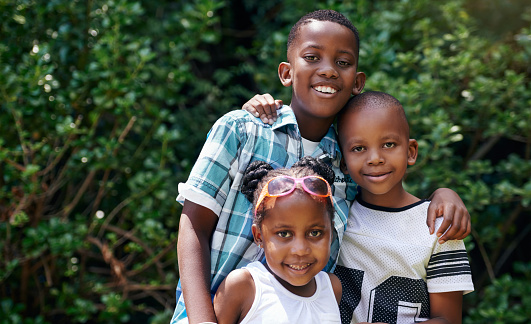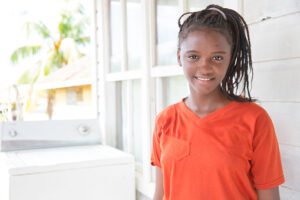Guyana
Adopting from Guyana
Hopscotch’s newest adoption program assists in the placement of Guyanese children from 12 months to age fifteen years and kinship adoptions when appropriate. However, children younger than 12 months are rarely offered to adoption, unless they have a significant special need. The adoption of children or infants abandoned at birth, relinquished or parental rights are terminated must be advertised in a local newspaper for three consecutive Saturdays prior to proceeding with the child’s adoption. This step is only done after the child has been identified. Eligible Guyanese children typically reside in orphanages and the care is noted as varied in quality. Updates are provided to families when permitted and made available to Hopscotch. *Notice: At this time, the Department of State has placed a hold on all adoptions that are not classified as transition cases until Guyana has implemented the Hague to the USCIS satisfaction. Please continue to check in with our office as we are continuing to communicate with the Guyanese Child Protection Authorities regarding specific cases of critical nature.
Children Eligible for Adoption
 Hopscotch’s newest adoption program assists in the placement of Guyanese children from 12 months to age fifteen years and kinship adoptions when appropriate. However, children younger than 12 months are rarely offered for adoption, unless they have a significant special need. The adoption of children or infants abandoned at birth, relinquished or parental rights are terminated must be advertised in a local newspaper for three consecutive Saturdays prior to proceeding with the child’s adoption. This step is only done after the child has been identified. Eligible Guyanese children typically reside in orphanages and the care is noted as varied in quality. Updates are provided to families when permitted and made available to Hopscotch.
Hopscotch’s newest adoption program assists in the placement of Guyanese children from 12 months to age fifteen years and kinship adoptions when appropriate. However, children younger than 12 months are rarely offered for adoption, unless they have a significant special need. The adoption of children or infants abandoned at birth, relinquished or parental rights are terminated must be advertised in a local newspaper for three consecutive Saturdays prior to proceeding with the child’s adoption. This step is only done after the child has been identified. Eligible Guyanese children typically reside in orphanages and the care is noted as varied in quality. Updates are provided to families when permitted and made available to Hopscotch.
Married couples of opposite sex and single women of any citizenship, heritage or faith, are eligible to adopt typically healthy infants and children, as well as children with minor to non-correctable special needs. Parents aged 25-65 years are eligible. There may not be more than 50 years between the adoptive parent’s age and no less than 17 years. Notice: At this time, Hopscotch is limiting applicants to Guyanese nationals and Kinship adoption only.
Program & Process
 Important: Since the implementation of the Hague Intercountry Adoption Treaty 2019, no adoptions are processing at this time. The information below is provided to you from the previous process until the Guyanese Central Authority has codified the new family laws and process under the Hague regulations.
Important: Since the implementation of the Hague Intercountry Adoption Treaty 2019, no adoptions are processing at this time. The information below is provided to you from the previous process until the Guyanese Central Authority has codified the new family laws and process under the Hague regulations.
After a child has been identified, the prospective adoptive parents must submit a dossier which includes an application to the Adoption Board (“the Board”). Upon making contract to adopt a child from Guyana with Hopscotch, you will be provided a dossier template package. The application form, also known as the First Schedule, consist of two parts, Form A and Form B. Form A is completed and signed by the prospective adoptive parents and consists of biographical data for the applicants It also includes information on references for the prospective adoptive parents. Form B is a medical certificate for the child or children to be adopted, which must be completed by a duly qualified medical practitioner.
After Hopscotch Adoptions’ in country partners file the prospective adoptive parent’s dossier with the Adoption Board, an acknowledgement slip with an appointment date for the initial adoption interview will be issued. The prospective adoptive parents, the biological parents, and child/ren, must appear before the Board at the interview. The appointments are usually scheduled within 4-6 weeks after the application is filed. You’ll be met at the airport and transported by Hopscotch’s in country representative and assisted with all aspects of your stay throughout the process.
 Accommodation options include, hotels, resorts or furnished private apartments. You’ll have access to a host throughout your stay and for every ‘working’ day related to your adoption visit while in country. You’ll be loaned a local phone with pre-programmed numbers for all team members in Guyana and at Hopscotch, along with the numbers for the embassy and the attorneys working on your behalf. Every step and every comfort needed will be afforded to each client family.
Accommodation options include, hotels, resorts or furnished private apartments. You’ll have access to a host throughout your stay and for every ‘working’ day related to your adoption visit while in country. You’ll be loaned a local phone with pre-programmed numbers for all team members in Guyana and at Hopscotch, along with the numbers for the embassy and the attorneys working on your behalf. Every step and every comfort needed will be afforded to each client family.
A Guyanese social worker from Child Protection Services will interview the birth parents (if known), prospective adoptive parents, and the children separately at the initial adoption interview. At the conclusion of the initial interview, A social worker is assigned who begins to observe the interaction between the child and applicant. Upon observation of bonding over a period of 2-4 weeks, then the CPA communicates it consent to act as Guardian Ad Litem. A letter addressed to the Chief Justice of the High Court is sent to the Applicant’s attorney. An application is then made for the First Order.Two copies of this letter must also be filed in the High Court by the attorney for the applicants, along with an application to appoint the CPA guardian ad litem of the child for the period between this stage and until the adoption is finalized in the High Court and the prospective parents are awarded custody. Obtaining the order may take up to six months depending on the court’s calendar.
If you are found eligible to adopt, and a child is available for intercountry adoption. Each family must decide for itself whether or not it will be able to meet the needs of a particular child and provide a permanent family placement for the referred child. Hopscotch strongly encourages prospective adoptive families to seek out the counsel of an International Adoption Pediatrician specialist for the purposes of review and evaluation in determining the suitability of the parents in meeting the child’s needs.
 The Court will grant guardian ad litem (also called first order) to the CPA, then, the CPA conducts a more thorough investigation of the case. The investigation includes a visit by an officer of the CPA to the temporary residence of the prospective adoptive parents to ensure that the welfare of the child is being met. If the child does not live with the prospective adoptive parents, a probationary period is allowed for bonding between the prospective adoptive parents and the child. The bonding period must take place in Guyana. The Board receives a report of the investigation.
The Court will grant guardian ad litem (also called first order) to the CPA, then, the CPA conducts a more thorough investigation of the case. The investigation includes a visit by an officer of the CPA to the temporary residence of the prospective adoptive parents to ensure that the welfare of the child is being met. If the child does not live with the prospective adoptive parents, a probationary period is allowed for bonding between the prospective adoptive parents and the child. The bonding period must take place in Guyana. The Board receives a report of the investigation.
After the investigation is complete the Board places the case on the Adoption Board’s calendar. Cases are usually scheduled 2-3 months in advance and are typically the last Wednesday of the month. The prospective adoptive parents, children, and birth parents (if known) are required to be present for the meeting. The prospective adoptive parents can also be required to be physically present in Guyana at least one month prior to the Board meeting. The social worker’s report based on the investigation and the home study is discussed by the Board and the Board seeks a consensus.
A decision in favor of the prospective adoptive parents would typically be followed within a week by a recommendation (Form C) of the case to the High Court for the making of a Final Order. The Board can defer a case until it is fully convinced about the competence of the applicant, or can reject it because there are no justifiable grounds for the adoption. At a later date the parties involved will be given notice to attend court before a judge in chambers for the issuance of the Final Order. Once the Final Order is issued, a copy of the child’s Adoption Certificate can be obtained from the General Register Office.
 Once the adoptive parents have obtained the child’s Adoption Certificate from the General Register Office, the child is eligible to request a Guyanese passport. After the passport has been obtained, our in country partner will schedule a medical examination to be conducted by an approved US embassy panel physician. The medical report is sealed and forwarded to the consular, along with the child’s records and the adoptive parents required documentation for the US embassy visa appointment. Visas are typically issued within 24 hours of the provisional petition appointment. Each step is done with the assistance of Hopscotch’s experienced in country partners.
Once the adoptive parents have obtained the child’s Adoption Certificate from the General Register Office, the child is eligible to request a Guyanese passport. After the passport has been obtained, our in country partner will schedule a medical examination to be conducted by an approved US embassy panel physician. The medical report is sealed and forwarded to the consular, along with the child’s records and the adoptive parents required documentation for the US embassy visa appointment. Visas are typically issued within 24 hours of the provisional petition appointment. Each step is done with the assistance of Hopscotch’s experienced in country partners.
Upon receipt of the child’s US IR-3 visa, the family may return to the US and is encouraged to re-finalize the adoption in the state of the family’s residence to secure a Certificate of Foreign Birth, the equivalent of a Birth Certificate.
Post Adoption Requirements
Upon arrival home, complete this Department of State’s case data verification form and make sure your social worker is aware and your first post adoption report visit has been scheduled. Keeping on schedule for your post adoption reporting is critical to the ongoing ability for other children in Armenia to have a loving family such as yours!
The Country
Guyana is a paradise for nature loves, adventure seekers and the Eco-tourists alike. Boasting a combination of fascinating and breathtaking natural beauty; pristine Amazonian rainforests, immense world wonder waterfalls, amazing wild life, blended with indigenous culture, rich heritage and the most hospitable and friendly people in the world. Guyanese cuisine is a culinary hybrid with native Amerindian, African, East Indian, Portuguese and Chinese influences.
Originally a Dutch colony in the 17th century and by 1815, Guyana achieved independence from the UK in 1966, Donald RAMOTAR was elected president in 2011.Guyana is located on the Northern part of South America, bordering the North Atlantic Ocean, between Suriname and Venezuela and North of Brasil. The climate is tropical; hot, humid, moderated by northeast trade winds; two rainy seasons (May to August, November to January). Ethnicity is comprised of East Indian 43.5%, black (African) 30.2%, mixed 16.7%, Amerindian 9.1%, other 0.5% (2002 census).
Guyana is the only English-speaking country in South America and shares cultural and historical bonds with the Anglophone Caribbean. Guyana’s two largest ethnic groups are the Afro-Guyanese (descendants of African slaves) and the Indo-Guyanese (descendants of Indian indentured labourers), together comprise about three quarters of Guyana’s population.
Families will want to be aware of medical risks reported by the CDC, including the top ten; ischemia of heart, stroke, cancer, diabetes, HIV, hypertensive heart disease, lower respiratory infections, self-harm, cirrhosis, interpersonal violence. Zika is prevalent and precautions should be taken. Many family members have experience with domestic violence. Trauma informed care is necessary for pre-education in preparation.
Country Post Adoption or Post Placement Requirements (PDF)
Fees
Contact Hopscotch Adoptions directly to request a fee schedule.
Recommended Reading
For Children
Guyana (Enchantment of the World) by Marlene Targ Brill
Memories & Reflections of Life in Guyana by Mrs. Norma Jean
Fables & Tales of Guyana Volume 2 by Mrs. Norma Jean
Macmillan Guyana Junior Atlas by Macmillan Caribbean
Kids Travel Journal: My Trip to Guyana by BlueBird Books
General
Guyana (Bradt Travel Guides) by Kirk Smock
The Guyana Story: From Earliest Times to Independence by Odeen Ishmael Guyana by Arif Ali
What’s Cooking in Guyana by Carnegie School of Home Economics
Guyana, Guyane & Suriname (Footprint Focus) (Footprint Focus Guide by Ben Box
Coolie Woman: The Odyssey of Indenture by Gaiutra Bahadur
Lonely Planet South America on a shoestring (Travel Guide) by Lonely Planet, Regis St Louis, Sandra Bao and Greg Benchwick
Guyana Stories & Passages by Dr. Hanif Gulmahamad
Wild Coast: Travels on South America’s Untamed Edge by John Gimlette
Walk Wit’ Me…: All Ova Guyana by Helena Martin
My Heritage – Memories of Growing up in Guyana, South America: Volume 1 by Alwin A Kalli
Guyana by Elise Turcotte and Rhonda Mullins